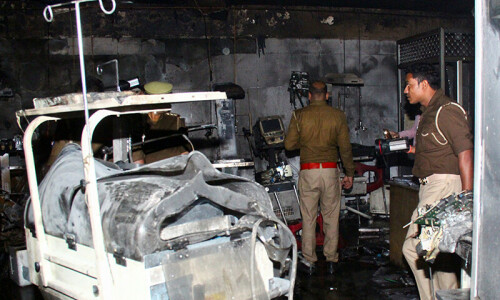In Islamabad, some personalities who make shadowy deals over lands are as well known as the politicians who grace the television screens each day.
As recent events involving the Supreme Court have also shown, some individuals acquire a nefarious reputation in this land business.
However, it is noteworthy that the land mafia is a nexus comprising politicians, criminals, property dealers and corrupt government officials and it does not just comprise some individuals.
The acquisition of land in a consolidated chunk is needed for launching a housing society. But when a company begins purchasing land, it unwittingly announces its intentions to the existing residents of that area.
As a result, many owners simply refuse to sell at the market price while others may not be interested in parting with their land – regardless of price.
This is where the land mafia or more accurately the criminal elements come in – to make an offer, the owner cannot refuse. And for this they charge the housing societies.
Muhammad Naeem, owner of ‘Friends Property Consultant’, explained that housing societies make a deal with criminals or influential personalities (which can include politicians or those with access to politicians or to government officials concerned such as those working in the CDA or the police) to get the marked land vacated.
“In Zone II market the estimated market rate is around Rs400,000 per 500 sq yd but housing societies pay around Rs650,000 per 500 sq yd to influential personalities of the area and sign two agreements with them – one is for the purchase of consolidated land and the second guarantees possession,” he said.
“By acquiring the land and then selling it to the housing societies, these people can easily make a profit of over Rs200 million for handing over 500,000 sq yd land (without any investment). Of course this money is then shared with politicians or even the policemen who may have helped in the acquisition of that land,” he said.
At times, this acquisition is anything but legal or ethical. Reluctant owners are coerced, bullied and threatened into selling land – sometimes they are even accused of crimes such as murder to get them to comply.
“In some cases, the owner’s family members have been kidnapped. And there are also cases in which land holders have been killed,” he said.
Individual land owners were not the only victims. Even smaller housing societies are not spared. “Some housing societies could not be completed because other societies occupied their land by force,” said Malik Irfan, a property agent.
In other cases, land is bought by forging documents or acquired while the promised payment for it is not made.
Some of these tactics were described in great detail in the district and sessions judge report of 2009.
Players such as Malik Bari, Taji Khokhar and Malik Riaz feature prominently in the game played out in for the acquisition of the Defence Housing Society in this detailed account in which the use of violence and coercion is rampant.
Elsewhere in Islamabad, there are other players who operate in the cover of the night. In Zone II, two men, who made their initial fortune from drugs and are also known for organising illegal horse races are the ones people or societies turn to for land acquisition. The family of a well-known politician and senator monopolises the land evacuation business in Bhara Kahu and nearby areas of Zone III.
Though it is difficult to ascertain the full involvement of politicians in this business, there is evidence that it is widespread. A PML-N legislator, Anjum Aqeel, is accused of having cheated the National Police Foundation in Sector E-11 – he had not handed over the total land he had been paid for.
Another MNA from Islamabad, Tariq Fazal Chaudhry, is also accused of having paid for land with cheques that bounced. The numbers of criminal cases registered in recent years hint at how widespread coercion and malpractice is in the sale of land.
According to police officials’ estimations, during the last five years over 2,000 First Information Reports (FIRs) regarding land disputes were registered in police stations of the federal capital; most of these cases are under trial in district courts.
There are over 30,000 cases under trial in different courts at the district level. Of these, 40 per cent (12,000) cases involve land disputes.











































Dear visitor, the comments section is undergoing an overhaul and will return soon.